Khamenei's Man Involved In Money Laundering Between Iran, Pakistan
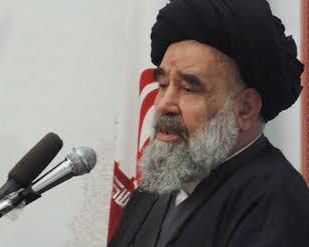
A report has revealed a money laundering network in Pakistan transferred huge amounts of illicit funds to Iran, with Supreme Leader’s representative as one of the recipients.

A report has revealed a money laundering network in Pakistan transferred huge amounts of illicit funds to Iran, with Supreme Leader’s representative as one of the recipients.
According to Pakistan’s Federal Investigation Agency, the group Shiite used pilgrims traveling to the cities of Najaf in Iraq and Qom in Iran to smuggle money, as well as hawala and hundi -- two informal ways of transferring cash across borders, which are illegal in Pakistan.
One of the people who received money from the main suspect in the case, identified as Ali Raza, was Abolfazl Bahauddini, Ali Khamenei’s former representative in Pakistan.
Raza was among 13 people arrested by police in Karachi in December 2020 and January 2021 on charges of money laundering and being “associated with a foreign intelligence agency”. They were members of an Iran-backed militant group, the Zainabiyoun Brigade, which is believed to have sent young members of the Pakistani Shiite community to fight in Syria.
The charges said Raza was giving an amount of $200,000 monthly to Bahauddini through his representative Syed Wisal Haider Naqvi -- a government official, but it did not specify for how long Bahauddini had received the monthly payments.

The Israeli military has dismissed claims by Iranian media that IDF Chief of Staff Aviv Kochavi had admitted to the failure of security forces in dealing with the recent Tel Aviv terror attacks.
Iran’s official news agency IRNA claimed on Saturday that following the Tel Aviv shooting, Kochavi said the security forces could not control the situation and the perpetrator managed to escape easily.
The spokesman of the IDF, Brigadier General Ran Kochav, told Iran International on Saturday that the Israeli Defense Forces held a meeting to discuss the country's current security situation amid the rise of attacks on civilians on Friday but Kochavi didn’t talk about any failure of the security apparatus.
IRNA cited a report by al-Manar TV – the official media of Iran-backed Hezbollah Lebanese group – as its source.
However, the assailant of the shooting on Dizengoff street, identified as 28-year-old Ra’ad Fathi Hazem from the Jenin refugee camp, was killed by security forces a few hours later, something Iranian media affiliated with the Revolutionary Guard (IRGC) described as martyrdom.
The shooting spree that killed three Israelis and injured at least 10 others this week in Dizengoff street was the latest in a wave that has claimed the lives of 13 people so far.

Print media in Iran was full of criticism on Saturday highlighting the Raisi government's inefficiency and ineptitude in improving the dire economic situation.
After eight months in office, President Ebrahim Raisi has failed to make a dent in inflation, hovering around 40 percent, and rising food prices. Media in Iran are full of news about meat and vegetable prices breaching new levels, as the government starts to give food stamps to the hungry for bread.
Nuclear scientist and former lawmaker from Esfahan, Ahmad Shirzad told Etemad Online website: "One of Raisi's biggest problems is that he appointed almost everyone in his clan to key posts in the government regardless of their expertise. Anyone who bows to him will become a manager. This leaves no hope for the government's future."
Shirzad added that even a reshuffling of the cabinet is not likely to lead to improvement because Raisi will most likely choose people who are even weaker than current officials.
Shirzad pointed out that although Raisi pretends to be powerful, he is not the one who makes all the decisions. He and his ministers simply carry out decisions that are made by others. Shirzad did not name who "others" were, but in the Iranian context that could only mean Supreme Leader Ali Khamenei.
It is clear to most commentators in Iran that there should be a nuclear deal with the United States to lift sanctions and this decision lies with Khamenei. But this is not something they can say publicly, as it would be seen as criticizing the Supreme Leader. Instead, attacks intensify against Raisi for the deteriorating economic situation.
During the weak, other critics wondered where is all the extra money from additional oil exports Raisi claims his government was able to pull off despite United States’ sanctions.
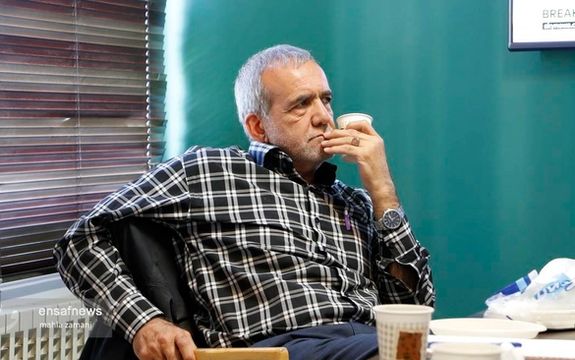
Meanwhile, reformist lawmaker Massoud Pezeshkian said in an interview with Didban Iran website that "Iran belongs to all Iranians not to the members of a certain group." Criticizing Raisi's inaction, he said, the president made a lot of promises during his campaign without realizing that he has to fulfill some of them, or be criticized.
"You cannot swear at the United States from outside the government, but when you run the government and need to take care of the people's livelihood amid economic problems, then you will see that you need a practical and realistic approach to political matters," Pezeshkian said.
Asked whether the impeachment of Raisi's economic ministers and reshuffling of his cabinet would be a solution to the country's problems, Pezeshkian said: "I do not believe that would solve any problem as long as Raisi and his government do not change their approach to management." He added, "When you have no idea of the road ahead and no plan to go further, even the best driver in town cannot help you reach your destination, if you have one."
In another development, reformist political commentator Abbas Abdi said in a commentary in Etemad website that "all of Raisi's propaganda and accusations against the previous government have come back to hit him like a boomerang."
He wrote, "all politicians magnify their own performance and belittle their predecessors' achievements, but if you do this in an exaggerated way, as Raisi did, then you will get a result contrary to what you had in mind."
With all the criticisms Raisi voiced about the administration of Hassan Rouhani, people expected that he would solve some issues within a few months, but problems are still there after eight months and there has been no improvement to make the nation hopeful, Abdi said.
He added that "The elite wanted to see that Raisi forms an efficient cabinet, and for the people, it was important to see that the cabinet would deal with inflation, unemployment, shortcomings in public services and so on. Had it happened, it would have been a positive change."
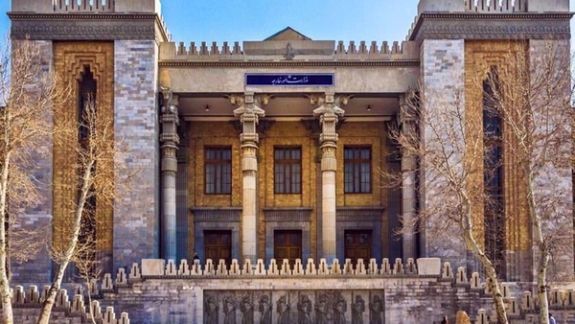
Iran on Saturday imposed sanctions on 24 more Americans in a largely symbolic move, as months of talks to revive a 2015 nuclear deal have stalled.
Among those sanctioned are former Army Chief of Staff George Casey and former President Donald Trump's attorney Rudy Giuliani.
Almost all the people named were officials who served during Trump's administration, which imposed sanctions on Iranian officials, politicians and companies and withdrew the United States from Iran's nuclear agreement with world powers.
In a statement carried by local media, the Iranian Foreign Ministry accused the sanctioned Americans - who also included several business figures and politicians - of supporting "terrorist groups and terrorist acts" against Iran, and Israel's "repressive acts" in the region and against Palestinians.
Eleven months of indirect talks between Iran and the United States in Vienna on salvaging the 2015 deal have stalled as both sides say political decisions are required by Tehran and Washington to settle the remaining issues.
Gen. Austin Scott Miller, former commander of US forces in Afghanistan, former Commerce Secretary Wilbur Ross, and several former ambassadors are among the officials targeted by the new Iranian sanctions.
In a similar move announced in January, Iran imposed sanctions on 51 Americans, many of them from the U.S. military, over the 2020 killing of General Qassem Soleimani in a drone strike in Iraq.
Last year, it imposed sanctions on Trump and several senior US officials.

An Iranian lawmaker says the parliament is prepared to impeach President Ebrahim Raisi's economic ministers, but Majles leaders intentionally delay the process.
Lotfollah Siahkali, a lawmaker from Ghazvin and a member of the Iranian parliament's Industry Committee, said in an interview with Rouydad24 news website that the motion to impeach Iran's Industry Minister was handed over to the presidium in early March, but the body has still not put it on parliament’s agenda.
The Majles (parliament) began to warn Raisi about the weak performance of his economic team including the ministers of industry (Reza Fatemi Amin), labor (Hojjat Abdolmaleki) and economy (Ehsan Khandouzi), two months after Raisi took office in August 2021. Since then, Raisi has said repeatedly that he is planning a reshuffling but has not done anything yet. He had promised both during his election campaign and in the following months that he was adamant to improve the critical economic situation of ordinary people.
In the meantime, lawmakers have renewed their calls for impeachments almost every month. Siahkali said the ministers have been constantly lobbying with the Majles presidium to delay their impeachment. At least in one case, Majles Speaker Mohammad Bagher Ghalibaf told the lawmakers to wait until the Iranian New Year in late March before beginning to table the impeachment motion for the labor minister.
While the government claims it is exporting more oil and gas, inflation remains high, with people falling deeper into poverty. Lawmakers want to know why the situation is not improving.
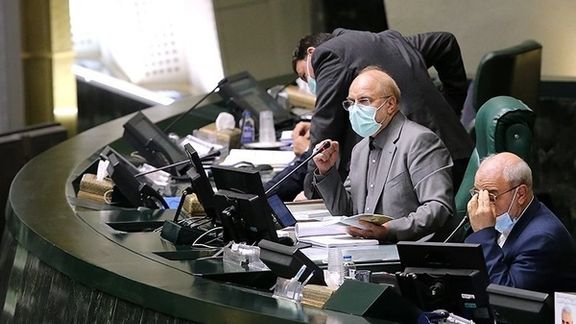
Some have concluded that either the government is not telling the truth about boosting oil and gas exports, or it is spending the revenues on something other than improving the people's livelihood.
Siahkali is focused on the plan to impeach the industry minister by pointing out his failures and make sure that none of the economic ministers can avoid being impeached.
At the same time, complaints about the performance of other economic ministers have been on the rise. Iranian economist and Al-Zahra University academic Hossein Raghfar said this week that rising inflation and the consequences of handing over oil sales to powerful institutions outside the oil ministry and the National Iranian Oil Company, mainly to military entites such as the IRGC, are two of the problems created by the Raisi administration for Iran's ailing economy.
While some of the economists in Iran have predicted a triple-digit inflation rate in the coming, Raghfar said in his interview with the Iranian Labor News Agency (ILNA) that inflation will certainly rise further, while the government keeps publishing unrealistic figures, which people cannot believe.
He insisted handing over oil sales to the military sharply raises the cost of economic transactions and will lead to widespread corruption. All this will adversely affect the economy by creating instability that deterring investments. He added: "In this situation, we can say with a good degree of certainty that the recession and inflation, which overwhelmed the economy in the 2010s will continue."
Meanwhile Raghfar argued that even if a nuclear deal is signed and sanctions lifted, it will not be easy for Iran to solve its economic crisis. "I believe even without foreign economic problems; Iran's economy will find it hard to recover. There might be some additional revenue, but this will not affect the situation of investment and employment." He added that the Iranian government does not seem to have any solution to tackle these problems in the future.
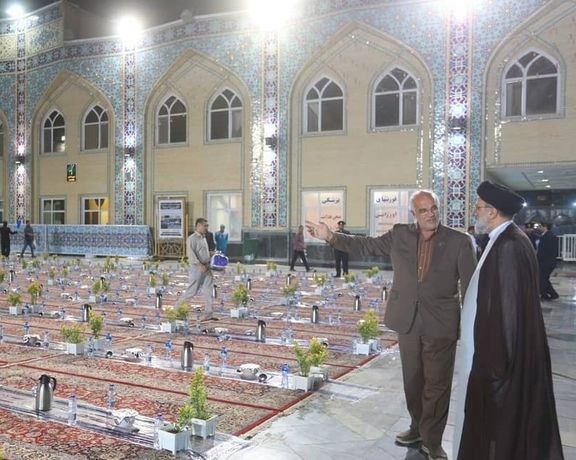
Some Iranian media report that an Iftar dinner by Iranian president Ebrahim Raisi was cancelled after most invited guests who were artists declined to attend.
Sharq newspaper and others reported Saturday that the Ramadan dinner, or Iftar, scheduled for Friday was cancelled after “99 percent” of artists, actors and film industry personalities declined invitations using various excuses, such as the Covid pandemic, travel or other reasons.
The government’s official news website IRNA strongly denied the reports as “complete fabrication”, insisting that the Iftar was cancelled due to high air pollution in Tehran. IRNA added that the dinner was supposed to be served in an open courtyard of the presidential complex but due to pollution it was decided to hold indoors, but the space was too small for accommodating 170 guests.
Sharq, however, emphasized that the real reason for the cancellation was the refusal of most invitees to attend.
The Iftar invitation by the president for artists and cinema figures has become an annual tradition in recent years. In 2018, many declined the invitation by then-president Hassan Rouhani, saying that he had not fulfilled his election promises.
Raisi’s leadership is being sharply criticized in the media, as Iran’s economic conditions deteriorate, and food prices continue to rise. Reports say that many working class people cannot afford even bread and buy it with a promise to bakeries to pay later.